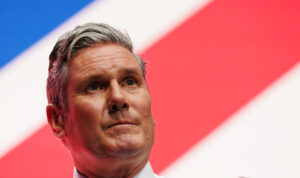This was the week that was. Fully a third of the parliamentary Labour Party rebelled on a vote that will have no real-life consequences whatsoever: political theatre for the impotent. Meanwhile, on the other side of the aisle, the Government announced it was bringing forward legislation to declare something true that the Supreme Court had just ruled false. “Insanity is contagious,” wrote Joseph Heller in Catch 22. Perhaps we’re all catching it.
So much of our political commentary is spent speculating about how these absurdist battles will play out. Will Keir Starmer’s judgement over Gaza be vindicated come election day? Will Rishi Sunak prove us all wrong? Is the Prime Minister showing courage or weakness in sacking Suella Braverman and bringing back David Cameron? What we all seem to agree is that history will be the judge, that when the general election comes around we will have our answers. Somebody will win and somebody will lose; one will have ridden the tide of history and the other will end up as mere flotsam. But there are currents in politics pulling at events far below the surface, often more powerful than those we obsess about in our day-to-day coverage.
“The success of… movements of protest cannot be measured by their immediate political failure,” wrote Lord Blake, the great biographer of Benjamin Disraeli, who in his earlier career led the rebel alliance of romantic Tory ultras called Young England who worshipped the old aristocratic order. By any metric, Disraeli’s Young England failed politically. And yet, for Blake, these movements cannot be understood solely by their parliamentary success, but must be regarded “as symbols and examples that lend an imaginative glow to the dull course of party politics; showing that there are other ways to fame than conformism, diligence and calculation”. The same is true today.
We must shake ourselves from the notion that victory and defeat are the only things that matter. There are other ways in which the course of a nation is affected, often with more profound consequences than what a leader says or does.
Britain’s relationship with Europe is the perfect such example. Between the Schuman declaration of 1950 — the foundational moment of today’s Europe — and Brexit, there were any number of apparently decisive moments which turned out to be less decisive than they first appeared. In 1971, the House of Commons finally voted to join the Common Market and that was that: a long-running drama came to a conclusion. Harold Macmillan, who had failed to lead Britain into the EEC the previous decade, waited in Dover to hear the news and lit a beacon to announce the historic turning point, which was then answered across the water in Calais. Four years later, the British public ratified the decision by a crushing margin in the country’s first ever referendum. The end.
As Robert Saunders captures in Yes To Europe, a triumphant Harold Wilson was hailed a political giant for his skilful handling of events. A cartoon in The Daily Express portrayed him parading in triumph through the streets of London, a Roman emperor in a chariot drawn by Ted Heath and Roy Jenkins with Margaret Thatcher throwing flowers from the sidelines. Behind him were the poor, huddled masses of Labour eurosceptics dragged along in chains. The Sunday Times summed up the wisdom of the day: “If politicians are to be judged by their ability in the end to get what they want, Harold Wilson is a great politician.” But politics has to be about more than this. While Harold Wilson got what he wanted, within a year he was gone, a broken man.
We never seem to learn this lesson. In 1977, Professor Anthony King published the first history of the referendum campaign, painting the “Yes” victory as a triumph for the moderate political centre against what would now be called the populists. King speculated what might have happened had there been a No vote: it would have undermined Wilson and Callaghan while strengthening the Labour Left. As Saunders says of King’s argument: “Benn or Foot might have become leader, opening a fissure between ‘the moderate centre’ and the ‘extreme Left’. Roy Jenkins and Shirley Williams might have left to form a new party, carrying many of their most popular colleagues with them, all of which could have had the cumulative effect of banishing Labour from power ‘for at least a generation’.” But as Saunders puts it: “This, of course, was almost exactly what happened a few years later.”
By 1980, Michael Foot was leader of the Labour Party and Thatcher had become prime minister. By 1990, Thatcher — who had campaigned for a Yes vote — had become euroscepticism’s first martyr. By 2000, the Conservative Party was preparing a “Save the Pound” election campaign and by 2010 its leader was vowing to veto the new European treaty if elected. And we all know what happened in 2020. The great current of history can move in the opposite direction from how it looks on the surface; a political riptide difficult to spot from the shore, but powerful nonetheless.
Sometimes political decisions move in one direction but the mood of a party or country moves in another. In retrospect, the Labour Right won their struggle with the Left in 1975, but were seen to have betrayed the soul of the party. Something similar happened for the Blairites after the Iraq war and for unionists after the Scottish referendum in 2014. Perhaps we are also seeing that play out now after the Brexit referendum of 2016.
While this week in Westminster was extraordinary, perhaps that’s not for the obvious reasons. Suella Braverman was sacked, the Tory right had the wind taken out of its sails by the Supreme Court, David Cameron returned and Keir Starmer saw off the Left of his Party. The centre is back in charge of both political parties and, by extension, the country. Whatever happens at the next election, there will be no great changes. Our relationship with Europe, Ireland, the Middle East, China and the United States will largely remain as is. We will maintain our nuclear deterrent, the rough balance of tax and spending, education and health policies. All will be well for those who prize macro stability.
But what is happening under the surface? Who is winning the battle for the soul of each party? First, let’s take the Labour Party. The obvious point is that Starmer has emerged from this week with his authority intact and his chances of becoming prime minister enhanced. His party is now even further ahead in the polls than it was before. As things stand, he stands a very good chance of not only being elected, but serving as prime minister well into the 2030s. All this can be true and important — and for it to also be true that having a third of your parliamentary party rebel on an issue of core judgement before you’ve even become prime minister is a warning of problems to come.
Should Starmer become prime minister, foreign policy will quickly intrude on his premiership. Donald Trump might well have already won the presidency or could do so soon afterwards. It goes without saying that a Trump presidency will present particular challenges for a Labour prime minister leading a pro-European, pro-Palestinian movement. Let’s remember that Israel’s war against Hamas in Gaza may still be raging in a year’s time — or even in five year’s time. The humanitarian crisis may be even more acute, the pro-Palestinian Left even more angry. Looking at the Labour party today, its foreign policy remains remarkably similar to what it might have been under Clement Attlee, Harold Wilson or Tony Blair — and yet culturally the Left has become more more anti-American, anti-Israel, and pro-European. These are not things Starmer can simply lead in another direction, only manage.
On the Conservative side, it is hard to know where to start. There is more than a passing resemblance to John Major in the mid Nineties who, like Sunak, was more in line with establishment thinking than his own supporters’ instincts, and was forced into pathetic shows of nationalism to compensate for his overall failures of policy.
This week, Sunakism took control of the Tory party, with Cameron and other centrist figures brought into the cabinet. The prime minister’s Rwanda policy was then thrown out by the Supreme Court, who said it breached a whole array of international treaties that Britain had signed up to. In response, rather like Major’s doomed beef war with Europe, Sunak has gone to war to defend the policy, with the absurd notion that he will pass a law to simply declare the country safe. Like Major in the late Nineties, the likely result is that this will do little to ameliorate unhappiness within the Conservative Party or increase his chances of holding back the tide of support for Labour, which has declared its opposition to the scheme.
Perhaps the most important thing here is not whether Sunak will succeed or fail with his approach, but what will happen to the mood in the Conservative Party. From 1997 onwards, Britain’s place in the European Union seemed to grow ever more secure as Tony Blair triumphed signing up to one treaty after another, only for the Conservative parliamentary party to grow ever more sceptical until, eventually, the sceptics won.
Today, you have to wonder what is going to happen to Britain’s membership of the European Convention of Human Rights. Suella Braverman has been kicked out of the cabinet, but will Suellaism eventually take hold of the Conservative soul? This will not be decided in a single election, or even multiple elections, but by trends working away under the surface, buffeted by events, stories, scandals and political groupings operating beyond the remit of mere leaders, lending Blake’s “imaginative glow to the dull course of party politics”.
Braverman may never become Tory leader. She may end up leading a faction in parliament that suffers defeat after defeat, like Bill Cash in the Nineties or Tony Benn in the Eighties. But that doesn’t mean her politics will die or Britain’s membership of the ECHR will remain secure. The same is true of the Labour Left, which will not disappear simply because Keir Starmer triumphs in 2024 or does not.
Politics is not some placid, obedient sea able to be parted by whichever Moses is in charge at that moment. It is tidal and choppy, issues, constantly being shaped not just by leaders and calculation, but by events, scandals, ideas and, yes, the losers of politics.
Disclaimer
Some of the posts we share are controversial and we do not necessarily agree with them in the whole extend. Sometimes we agree with the content or part of it but we do not agree with the narration or language. Nevertheless we find them somehow interesting, valuable and/or informative or we share them, because we strongly believe in freedom of speech, free press and journalism. We strongly encourage you to have a critical approach to all the content, do your own research and analysis to build your own opinion.
We would be glad to have your feedback.
Source: UnHerd Read the original article here: https://unherd.com/




